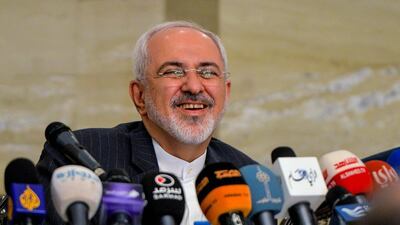Europe and Iran put on a united front over the 2015 accord on freezing the country's nuclear programme on Thursday, warning the US against a decision to supper the deal.
Mohammad Javad Zarif, the Iranian foreign minister, welcomed backing for the accord, warning Tehran's commitment to the agreement was conditional on full US compliance with the agreement.
President Donald Trump is expected to continue sanctions waivers that accompanied the accord in a decision to be made later Thursday despite his refusal to certify Iran's compliance with the pact late last year. “You either waive the sanctions or you don’t and if you don’t you’re in breach,” an anonymous official said.
Boris Johnson, the British foreign secretary, who represented one of the three EU states in the meeting hosted by the European Commission took the stance that the US must come up with a viable alternative before it can scrap the agreement.
"I don't think anybody has so far produced a better alternative ... as a way of preventing the Iranians from going ahead with the acquisition of their military nuclear capability," he said. “The Iran nuclear deal makes the world safer. European partners were unanimous today in our determination to preserve the deal and tackle Iran’s disruptive behaviour."
Federica Mogherini, the EU foreign affairs representative, reiterated the European view that Tehran was living up to its obligations under the deal.
"The deal is working, it is delivering on its main goal which means keeping the Iranian nuclear programme in check and under close surveillance," Mrs Mogherini said.
"The unity of the international community is essential to preserve a deal that is working, that is making the world safer and that is preventing potential nuclear arms race in the region. And we expect all parties to continue to fully implement this agreement."
In defiance of Mr Trump's efforts to withdraw Washington's involvement, the Europeans have sought to cast the battle to save the deal as important to the principle of non-proliferation.
Sigmar Gabriel, the German foreign minister, described the accord as one of the "core elements of global [nuclear] non-proliferation".
It emerged on Thursday that senior Iranian leaders have lain the blame for recent demonstrations on the failure to secure full sanctions relief since 2015. Jack Straw, a former British foreign secretary, who returned from a trip to Tehran earlier this week, conceded the leadership appeared rattled. Mr Straw detected a “pretty high degree of questioning about where Iran goes," he told the Guardian newspaper.
Protests began on December 28 over economic issues, regional policies and the supremacy of the religious establishment. Eighteen demonstrators were killed and up to 3,700 people have been arrested.
While Mr Trump appeared poised to offer the deal something of a lifeline, the US administration is also ready to impose a host of new sanctions against Iran and its proxies. US officials said the measures would target Iranian businesses and arms dealing middlemen.
European officials have however conceded that Mr Trump's frustration over weaker aspects of the deal is well grounded and deserves support. In particular there is sympathy with the US push to end the deal's "sunset clauses", which phase out restrictions on Iranian activities in the next decade.
The ban on Iran dealing in enriched uranium ends in 2025 and while Iran maintains it wishes to develop an energy industry after that point, the enriched uranium can also be used to make nuclear weapons.
Mr Johnson also raised the continued incarceration of the British-Iranian charity worker Nazanin Zaghari-Ratcliffe, as well as other dual-national consular cases and the treatment of workers with the BBC Persian service with Mr Tehran’s Mohammad Javad Zarif.
Mrs Zaghari-Ratcliffe, a mother-of-one, was arrested in 2016 during a holiday visit to show her baby daughter Gabriella to her parents.
The 39-year-old, who lived with her English husband in Hampstead, north London, has been handed a five-year sentence over allegations, which she denies, of plotting to overthrow the Tehran government.


